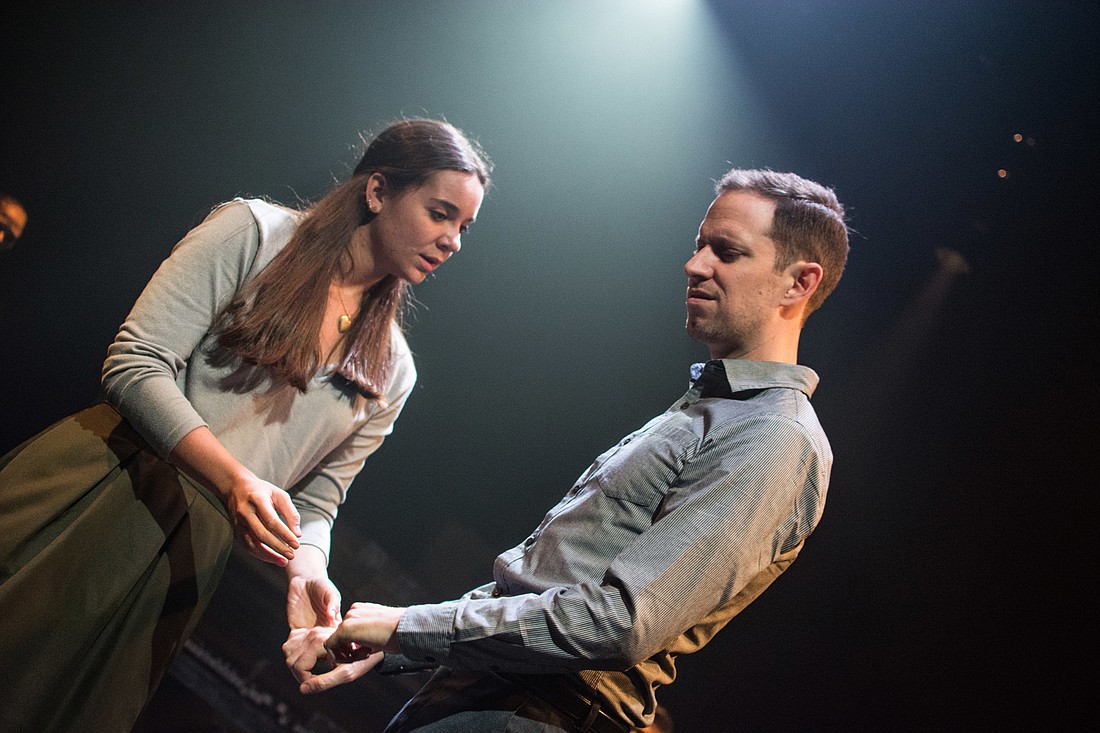- April 15, 2024
-
-
Loading

Loading

Playwright Nick Payne has the human brain on his mind. His “Incognito” explores this terra incognita on the Urbanite Theatre stage. The quest unfolds in three case studies. The first two are real; the third is fictional.
In 1953, Henry Molaison (Brendan Ragan) agrees to psychosurgery to cure his violent epileptic seizures. The operation apparently succeeds. But it kills Henry’s short-term memory.
In 1955, Thomas Harvey (Matt Crabtree) performs an autopsy on the late Albert Einstein. He walks away with the good professor’s brain — preserved in a jar of formaldehyde, of course. For the rest of his life, Thomas carts Einstein’s brain (or bits of it) around with him in the trunk of his car. He intends to unlock its secrets. He doesn’t.
In 2017, the London police find an amnesia victim under a bridge. Having suffered some unknown trauma, this unidentified man has lost all of his memories. He fills the void with an invented persona called “Anthony” — and a fictional history to go along with it.
Those are the three main cases. But Payne’s ambitions are far greater, and far more complex. He’s stuffed his play with 21 characters, some American, some British, all living in different places and times. (Only four actors portray the whole bunch.) To further increase the level of difficulty, Payne’s narrative is as non-linear as a William Burroughs “cut-up” novel. He jumps around between seemingly disconnected vignettes. It’s up to you to put it all together.
Daniel Kelly’s direction is as lucid as possible with Payne’s deliberately brain-teasing script. The staging has no fixed orientation; actors face different compass points. Ryan Finzelber’s lighting constantly shifts, and constantly redirects your attention.
Brainy, and non-brainy theatergoers alike will find much to love.
Connoisseurs of a sense of wonder will savor an undiluted draft of that rare vintage. No cheap imitations or woo-woo mysticism here. Just a genuine sense of something beyond human understanding: Human understanding itself. Finzelber’s minimal set design aptly conjures the wonder this enigma is due. A bare stage, apart from four stools and a battered player piano that, in defiance of logic, plays. On the wall behind the stage a constellation of lights hints of dying brain cells. Or the first flash of consciousness.
Fans of Oliver Sacks and Steven Pinker will dig the lucid exposition of neurological arcana. But this is a play, not a science lecture. Payne’s characters are three-dimensional and all-too-human.
Lovers of live theater will appreciate the bravura performances that bring them to life. Four actors embody an ever-shifting crowd of characters with split-second changes in voice and mannerism. It’s like watching an old-time vaudeville performer spinning plates in the air. There’s a purely non-intellectual joy in the sight. Speaking of which …
Ragan is heartbreaking as Henry — a decent chap, condemned by fate to be a human Etch-a-Sketch. Brooke Benson is sweet as Henry’s long-suffering wife, Margaret. She stands by her man … at first. She hopes against hope that Henry’s memories will recover — then finally abandons hope. Crabtree’s Thomas Harvey has a mid-Western twang and a huckster’s machine gun delivery. (His accent turns instantly upper-crusty when he morphs into Henry’s British physician.) Sunny Smith plays Martha, the neuropsychologist attending to “Anthony.” She’s a die-hard materialist. “The mind is a storytelling machine,” Martha says. The mind’s story is, of course, fiction. Along with the “self,” “soul” and “free will.” Martha’s hard-boiled philosophy works in the lab, but leaves her clueless in human relationships. Her mental myopia spoils her mid-life love affair with Patricia (also played by Benson).
Materialist Martha is no mere mouthpiece for the playwright. Payne isn’t saying the mind is a meat computer. He doesn’t reduce human consciousness to any formula at all. The mind is a mystery. He doesn’t try to solve it.
For Payne, the sense of wonder is enough.